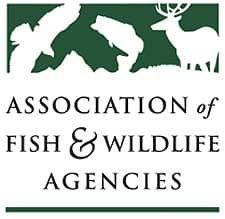Teaming with Wildlife Lauds Members of Congress for Safeguarding Imperiled Fish and Wildlife Species
OutdoorHub 03.04.14

The Teaming With Wildlife Coalition and the Association of Fish & Wildlife Agencies today lauded Senators James Risch (R-ID) and Mary Landrieu (D-LA), and Congresswoman Betty McCollum (D-MN) and Congressman Jeff Fortenberry (R-NE) for their leadership in championing legislation that supports on-the-ground conservation to prevent fish and wildlife from becoming endangered.
The Congressional Awards presentation culminated the Teaming With Wildlife Coalition’s annual, two-day advocacy Fly-In on Capitol Hill to raise awareness of the State and Tribal Wildlife Grants Program, the only federal program providing funding to states and their partners to conserve the more than 12,000 species that are at risk of landing on the endangered species list.
“I recognize that I am receiving this award because of hardworking Idahoans who work to maximize every dollar of the state wildlife grant funding I’ve worked to secure and to keep species off of the endangered species list,” said Senator Risch.
“I’m very gratified by your recognition of me for, hopefully, what is our good contribution to your work to educate, promote and protect that which is wholesome, natural and good for the well-being of our country,” said Congressman Fortenberry.
The State and Tribal Wildlife Grants Program provides each state and territory with approximately $1 million annually to develop and implement their congressionally mandated State Wildlife Action Plans. The Plans assess the health of each state’s wildlife and habitats; identify the problems they face; and outline the actions needed to conserve them over the long term.
“Whether it is management of sage grouse and lesser prairie chickens in the West or gopher tortoises and declining bat populations in the East, pro-active conservation programs are more effective and less costly than an ‘emergency room’ approach,” said Dan Forster, director of the Georgia Wildlife Resources Division and 2013-2014 president of the Association of Fish & Wildlife Agencies. “The State and Tribal Wildlife Grants program is our best prescription for preventative care.”
However, since 2010, funding for the State and Tribal Wildlife Grants Program has been cut by more than 35 percent. In addition, further cuts to program lead to increased federal ESA listings and threaten the associated jobs and local economies tied the $45 billion wildlife recreation industry.
In addition to recognizing Members of Congress for their support of the State and Tribal Wildlife Grants Program, the Teaming With Coalition’s Steering Committee presented two awards to Coalition members.
The Virginia Conservation Network, an affiliate of the National Wildlife Federation (NWF), received the Teaming With Wildlife Member Achievement Award for outstanding achievement in supporting funding for state wildlife diversity conservation.
The Network has worked in partnership with the Virginia Department of Game and Inland Fisheries and NWF’s Mid-Atlantic office over the past five years. Accomplishments include developing a strategy for safeguarding species of greatest conservation need from the effects of climate change by co-hosting two statewide workshops; and helping to grow the Virginia Teaming With Wildlife coalition by 60 members to reach a total of 188.
The Pennsylvania Game Commission (PGC) and the Indiana University of Pennsylvania (IUP) Research Institute received the State Wildlife Action Plan Partnership Award for outstanding achievement in implementing that state’s wildlife action plan.
IUP researchers are among the Commission’s most valuable partners as a result of the Institute’s understanding of the Pennsylvania Wildlife Action Plan coupled with experience finding and implementing solutions to the state’s conservation needs.
Joint efforts implemented by PGC and IUP include preparing and/or treating approximately 18,200 acres to create young forest habitat for golden-winged warblers since 2011; increasing monitoring of bat populations; surveying hibernacula for evidence of White Nose Syndrome; and researching new techniques to monitor bat populations and combat infections of hibernating bats.
Approximately 100 attendees participated in the annual Teaming With Wildlife Fly-in held February 25-26 in Washington, DC. Fly-in advocates held meetings with Members and staff in more than 150 congressional offices.
For more information about Teaming With Wildlife and State Wildlife Action Plans, go to www.teaming.com.

